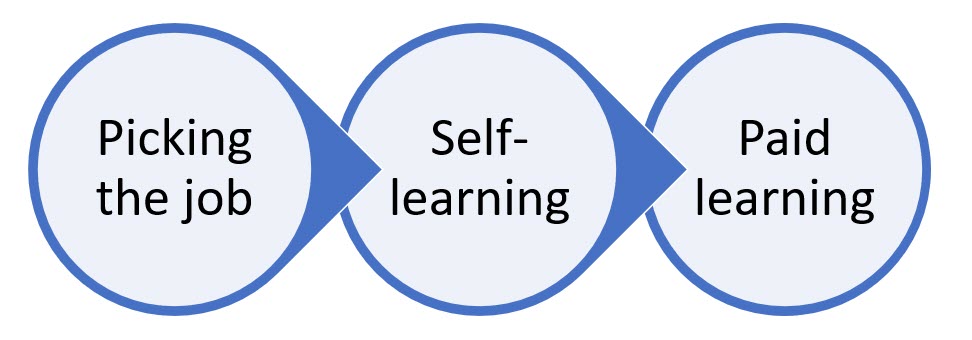Rule #1 to Get into Cybersecurity
Sep 23, 2022Start asking the right questions to get the answers that you need. In any forensic analysis, a dive into data needs a “why” before even looking at the bits and bytes. Without a “why”, you will never get the “who-what-where-when-how”. You will get information, but none of it may answer the question of why you are looking in the first place.
The same concept of asking the right question applies in asking “How do I get into Cybersecurity?” because this question cannot be answered reasonably. Even with the millions (billions!) of websites that attempt to answer this question, there are only 3 things to know to get into this field.

The three things are simply: 
Once you settle upon the specific job that you want, you can turn “How do I get into Cybersecurity?” into a more effective question such as “What are the things that I can do to learn and be competitive as a digital forensics analyst in the public sector?”.
Then, you can be given options and paths based on a clear objective. Otherwise, you may get generic answers like, “Get a degree.” Without knowing if the job that fits what you want requires a degree, you may be paying for a degree that you not only needed but might not even relate to the job that you want.
Any professional career requires time and money to learn. The more of one of these that you have, the less of the other you will need. No one has unlimited time, and no one has unlimited money. For this reason, learn to how to self-learn so that you can be self-taught in at least the basics. Save your money for paid education that is directly related to what you need.
So now, you picked a specific job, and you did some self-learning to at least know what you need to target with paid education. You should know by now whether you need a degree, or a specific certificate, or a specific skill. Spend your money on that specific need.
Opinion on degrees and certs
I do not support and do not not-support college degree programs or certifications (double negative much?). If these are needed for a job, then I support them. If they are not needed for a job but would make you happy, then I support them. Otherwise, I do not support spending the time nor money if they are not needed for a job (whether as a requirement or skill) or do not make you satisfied like a personal achievement.
Self-learning is not a one-time event
Self-learning occurs and continues through all three steps, until you quit whatever career you are in or do not wish to learn anymore.
Not all paid education is the same. Some is great. Some is ok. Some is horrible. In my experience, the presenter/instructor/professor makes all the difference. Second is the organization. If you must choose between a great instructor or a great organization with a mediocre instructor, choose education/training from the great instructor. You will learn more, be more engaged, and get better value for your time and money.
Everyone loves tools
Be prepared to have fun with all the tools but also acknowledge that you run the tools, not the other way around. Be finicky and picky in what you use to get the job done. Most tools today are awesome and generally it is user preference that sets the tools apart (and customer service, user interface, pricing, etc…). Don’t get hung up on any one tool. Choose the tool that fits the task. “One mind, any tool.”
The best DFIR resources
You will find practically everything that you need to pick a specific job, access all the self-learning information and test data that you will ever need, and find the best quality paid education from four websites:
These sites point to thousands of other sites, but in my opinion, are the best sites to bookmark and always come back to as a starting point.
My opinions are like everyone else’s opinions
My opinions are based on my experiences and education. Someone else’s opinions are based on their experiences and education. When someone is giving you their opinion for you, they are looking through their perspective and not through yours.
As much as one may try to see another’s point of view, it is impossible to really do this fully. With that, take any opinion as something to think about because you make the final decision on what you are going to do based on what you want to do and have to do.
Inspirations
Going through this journey, find inspirations to keep you motivated. Everything is easy at first, so have an inspiration and goals along the way.
The path forward
If you want to blaze a new path into this field and do it differently than anyone else, you are taking a risk. For me, I suggest taking a path that is already proven. Then once you reach your goal, blaze forward to where no one else has gone before. That is where innovation lives.
A beaten path eventually ends to where you can blaze a trail for others.